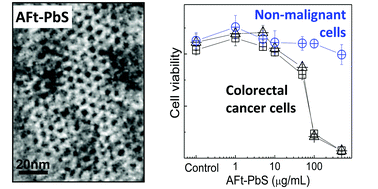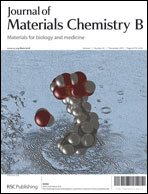Apoferritin-encapsulated PbS quantum dots significantly inhibit growth of colorectal carcinoma cells
Abstract
Colorectal carcinoma (CRC) is the 3rd most common cancer worldwide, thus development of novel therapeutic strategies is imperative. Herein potent, selective dose-dependent antitumor activity of horse spleen apoferritin encapsulated PbS quantum dots (AFt-PbS) against two human-derived colorectal carcinoma cell lines is reported (GI50 ∼ 70 μg mL−1). Following in vitro exposure to AFt-PbS, CRC cells fail to recover proliferative capacity, and undergo apoptosis triggered by the generation of reactive oxygen species (ROS). In stark contrast, the AFt-PbS nanocomposites do not affect the growth and cell cycle of non-tumor human microvessel endothelial HMEC-1 cells (GI50 > 500 μg mL−1). In vivo, AFt-PbS QDs are well tolerated by mice. Neither adverse health nor behavioral indicators were observed throughout the 15 day study. The photoluminescence of AFt-PbS combined with selective antitumor activity offer potential development of AFt-PbS for simultaneous non-invasive imaging and treatment of malignant tissue.


 Please wait while we load your content...
Please wait while we load your content...